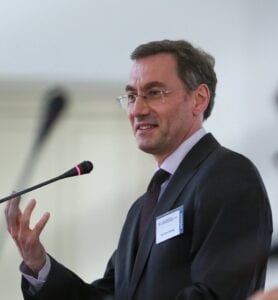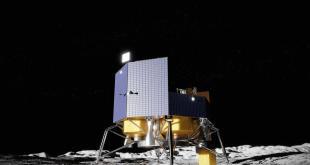By Viktoria Urban

Our Space Café WebTalk “33 minutes with Prof. Dr. Kai-Uwe Schrogl – Europe’s Space Ambitions – what’s up during this autumn?” Took place on Tuesday, 16th August, ending our 7-week summer break.
Kai-Uwe is the Special Advisor for Political Affairs at the European Space Agency (ESA) at its Headquarters in Paris. Between 2019 and 2021, he was seconded to the German Federal Ministry for Economic Affairs and Energy in Berlin to support the German Presidency of the Council of the European Union.
Before all this he was the Chief Strategy Officer of ESA, Director of the European Space Policy Institute (ESPI) in Vienna, Head of the Corporate Development and External Relations Department at the German Aerospace Center (DLR). Kai-Uwe is the current President of the International Institute of Space Law (IISL) and Co-Chair of the Global Future Council on Space of the World Economic Forum (WEF).
In connection with the upcoming CM22 (ESA’s Council at the Ministerial level), he stated that these conferences “provide the pulse” of the ambitions of Europe. ESA, with its programs, is the backbone of all European space endeavors, together with the programs of the European Union, and the national programs of ESA’s Member States.
Kai-Uwe explains that ESA and its Member States decide on large-scale programs every three years, along with activities associated with the agency’s space programs. This year, the agency is refocusing, reshaping and also recalibrating European space efforts. CM22 will be an occasion to provide a new vision for Europe, not only for the next three years, but for possibly decades to come.
Kai-Uwe thinks that during the past ten years, governments have further intensely understood that space is extremely important. Nowadays they are looking for support mechanisms, solutions to problems such as climate change and security threats. He said that Member State governments are actively searching for opportunities to invest. They can choose from optional program proposals and participate in the mandatory program with basic activities including science, technology development, and also education.
“If you want to reap the benefits of space, if you want to be autonomous… then you have to invest,” said Kai-Uwe.
ESA is active in the field of launchers, providing sustainability, expanding Earth observation and navigation services, telecommunications, satellite constellations, broadband, space safety, space traffic management, debris removal and many more. Among its recent achievements, the agency counts the launch of the James Webb Space Telescope with Ariane V and the recent launch of the Vega rocket as well as the imminent Artemis I mission along with the European Service Module (ESM), scheduled to launch on 29th August.
An additional initiative by the Director General will help in understanding whether and why Europe should have autonomous space exploration capabilities for humans. ESA has set concrete goals as well: to provide a report by a High-Level Advisory Group beginning 2023 shaping the understanding in geostrategy, economics and social areas, followed by the setting the technological and programmatic paths in order to implement the findings.
Space offers solutions to challenges on Earth and can contribute to making improve life of humans and other life and the environment, or at least reduce associated risks, claims Kai-Uwe. Hence, the money spent on space programs comes straight back to Earth.
“It’s not spending money… for the fun of it to the country, this money comes back, it solves issues, problems, and it provides decision makers with means for taking qualified decisions,” he says.
Kai-Uwe also explains that one of the key policy approaches for ESA at the moment is space sustainability, i.e., Debris Zero. The agency aims to produce no debris, and is planning on future technology missions for debris removal. In addition, ESA is making efforts regarding space traffic management, being the organisation with the best understanding of the associated technological requirements.
To listen to the Space Café WebTalk’s insights, you can watch the full program here:
Viktoria Urban, contributing Editor at SpaceWatch.Global: After graduating as a Journalist from Edinburgh Napier University, I am now doing an Astronomy and Planetary Science degree at The Open University (Scotland) which has enhanced my already existing love and enthusiasm for space. I am also a member of and a volunteer for several societies both in Hungary and in the UK and write online content on space for multiple companies as well. I hope my science communication will encourage many to find a job in the space sector, whatever their background and highlight important issues to ensure a sustainable space environment for future generations.





